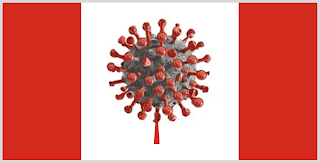Special Report: Canada is Catching Up, Sort Of
Today's post is by Corona-zona Senior Canada Correspondent Salishsailor
A few weeks ago, Canada was ranked #44 in number of vaccine shots administered per population among the 84 nations with over a million people. Today it comes in at #36. Canada is up to #19, if you count just shots given per 100 persons. [Which you should whenever you're making comparisons—Editor]
The upward curve in number of vaccinations is tracking the US curve but remains at about half the US daily rate—0.37 per 100 population versus the US rate of 0.74, according to Our World in Data. But with the Canadian plan for massively increasing vaccine availability, every adult could be vaccinated by Canada Day (usually celebrated on July first).
Aside from vaccination rates, though, Canada appears to have the edge on all other nations in future immunity testing. A research team at the University of Toronto led by Dr. Igor Staglijar have used the enzyme that lights up fireflies to create a test for antibodies that block Covid-19.
The enzyme, called luciferase (ahem), has been used for over a decade to detect antibodies for autoimmune and inflammatory diseases. For example, a Texas Medical Center team last year used the firefly enzyme to learn how the SARS-CoV-2 virus attacks humans.
But the Toronto team is the first to develop a practical, simple test for whether antibodies are attacking the virus (or virus proteins produces by vaccines). They split the enzyme into three parts, using a technique pioneered by Shawn Olson at the University of Utah. One part hooks onto a SARS-CoV-2 spike protein, and another part connects to a protein that attracts antibodies. The third part is like the ground-wire in your house circuit. When it links up the other two parts the antibody lights up for detection.
The low-cost test now is in human trials. It’s hoped it will be help researchers understand both the effectiveness of vaccines and their durability. Only time will tell.



